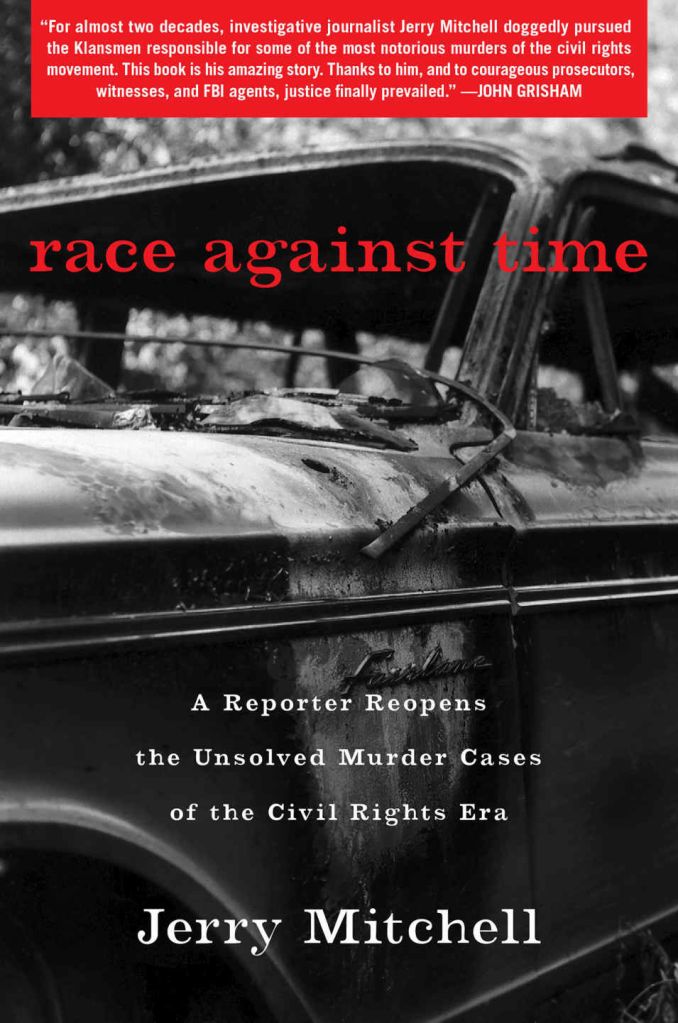Book review: ‘Race Against Time’
Published 12:00 am Sunday, June 13, 2021

- BOOK REVIEW
“Race Against Time: A Reporter Reopens the Unsolved Murder Cases of the Civil Rights Era” by Jerry Mitchell. New York: Simon & Schuster, 2020. 449 pages, $28 (hardcover).
“Through newspaper photographs and television news, Americans had witnessed the brutality in Mississippi for themselves,” Jerry Mitchell explains near the beginning of “Race Against Time: A Reporter Reopens the Unsolved Murder Cases of the Civil Rights Era,” his courageous effort to tell a story that desperately needs to be told before it’s too late. “In spring 1963, they saw police dogs attack civil rights workers in Greenwood. Months later, they observed the trail of blood left by NAACP leader Medgar Evers when he was assassinated in the driveway of his Jackson home. During the summer of 1964, Americans watched sailors tromp through swamps in search of three missing civil rights workers, (James) Chaney, (Andrew) Goodman and (Michael) Schwerner, who were last seen leaving the small town of Philadelphia, Miss.
Trending
“The killings came to define what the world thought of Mississippi, and no subsequent events had dislodged it by the time I came here in 1986 as the lowliest of reporters for the Pulitzer Prize-winning newspaper The Clarion-Ledger,” Mitchell continues. “I arrived the day before my 27th birthday, the same day the paper carried a story about the burial of Sen. (James Oliver) Eastland, the longtime chairman of the Senate Judiciary Committee who had bragged about having extra pockets sewn into his jacket to kill all those civil rights bills.”
If you want to know what the struggle for civil rights was (and is, given recent events) all about, I strongly suggest you make a pilgrimage to your local bookstore and pick up a copy of “Race Against Time” at your earliest convenience. That also goes for anyone who wants to know what hate looks like – up close and unvarnished. The picture Mitchell paints is not pretty; the level of detail he goes into while describing some of the most horrific acts of the 20th century is not for the faint of heart. But this is an important book that needs to be required reading for anyone who still naively wonders what all the fuss is about when it comes to race relations in this country. By the time you finish this unflinching look in the mirror, you’ll have a pretty good answer.
“Race Against Time” chronicles Mitchell’s tireless, laser-focused crusade to reopen and prosecute some of the most vicious murders of the civil rights era – before the inevitable passage of time makes the point moot. Much as the post-World War II Nazi hunters understood that bringing to account the architects and foot soldiers of the most horrific regime in modern history was playing out against an ever-encroaching deadline, Mitchell recognized earlier than most that the effort to bring these racist murderers to justice was taking place against the relentless passage of time. In fact, had Mitchell not made this his life’s mission, there is every reason to believe many of the convictions described in this excruciatingly superb account would never have taken place.
“Race Against Time” is arranged in four major parts, each detailing the cases he has investigated. Part I, “James Chaney, Andrew Goodman and Michael Schwerner,” is comprised of the first eight chapters; Part II, “Medgar Evers,” encompasses chapters nine through 28; Part III, “Vernon Dahmer Sr.,” is made up of chapters 29 through 44; Part IV, “Addie Mae Collins, Denise McNair, Carole Robertson, Cynthia Wesley,” consists of chapters 45 through 52; and Part V, “James Chaney, Andrew Goodman, Michael Schwerner,” chapters 53 through 82, revisits Part I.
Consider the case of Sam Bowers, the notorious white supremacist who in 1998 was finally convicted of murdering Vernon Dahmer in 1966. Mitchell not only accurately captures the facts of the case, but he brings a front-row perspective to his writing that is lacking in other accounts. After all, he actually spoke with Bowers in his role as a journalist who was desperately trying to uncover the evidence that eventually led to justice being served.
“As I looked further into Sam Bowers, he struck me on the surface as an unlikely person to head the Ku Klux Klan,” Mitchell reflects in chapter 31. “His more prominent grandfather was a Mississippi congressman who had spent his days railing against the white supremacist organization. His other grandfather bore the name of Abraham Lincoln. About a decade before launching the White Knights, Bowers had been on the brink of planting himself an early grave. After a liquor arrest and a bad business investment, he drove his pickup truck into the darkness, his only companion a loaded pistol. But before he could pull the trigger, something overwhelmed him. He came to believe that force was God calling him – a classic moment of conversion. Except that in Bowers’ case, he came to believe that God was calling on him to embark on a holy war for white supremacy.
Trending
“These days, I learned, Bowers was still running his company, Sambo Amusement Co., and teaching a Sunday school class each week at Hillcrest Baptist Church in Laurel,” the author continues. “If he had any worries about being charged with Dahmer’s murder, he wasn’t showing it. I knew if I called Bowers, he would simply hang up. I felt my best chance to talk with him would be to show up in person.”
An investigative reporter for The Clarion-Ledger in Jackson for more than three decades, Mitchell is the winner of more than 30 national awards and honors, including a MacArthur “Genius Grant,” the George Polk Award, Columbia’s John Chancellor Award and the Sidney Hillman Prize. A Pulitzer Prize finalist and a longtime member of Investigating Reporters & Editors, he left The Clarion-Ledger in 2019 to establish the Mississippi Center for Investigative Reporting. His articles have helped put four Klansmen and a serial killer behind bars. This is his first book.
“Truth rules,” Mitchell reminds us near the end of the book. “This has been a guiding principle of mine throughout my career. Truth rules, while hate thrives on obfuscation, murkiness and fear. I’ve been told time and again to let the past be. But I have long found that a true account of a painful past does more good than murky optimism. In our current fight against a new wave of white supremacists, a clear memory is important.”
I could not agree more – and I salute Mitchell for his quest to shape the future by never allowing us to forget the past. Highly recommended.
– Reviewed by Aaron W. Hughey, University Distinguished Professor, Department of Counseling and Student Affairs, Western Kentucky University.






